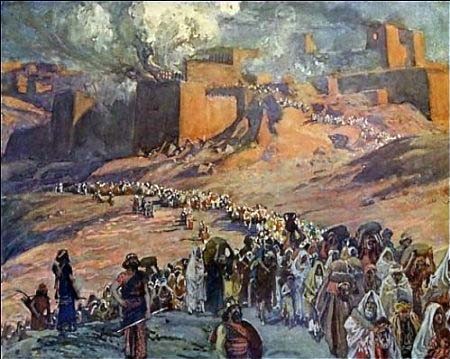By Marco van Putten
The Bible does not teach an All-reconciliation view (All or at least most people will be saved regardless). From their birth people do not seek God’s will and even when they are familiar with it they seem to be driven against it. Even or typically those born in a family of believers have this urge. God doesn’t give any promises regarding that. What the Bible does teach is God’s eternal loyalty to Its people and His Creation restoration plan to the benefit of them. In Isaiah however it is written that the whole of Israel has fallen away from God (Is 1:4-6) and that they have broken the eternal Covenant of God (Is 24:5). Therefore they could no longer be part of God’s people. Still Isaiah maintains that Israel is an eternal nation (Is 44:7). Precisely that fact guarantees the so-called ‘remnant of Israel’. This is not only written in Isaiah, but also in other Bible books (Dt 19:20; 28:62; Jer 6:9; 31:7; Eze 11:13; Mic 2:12; Sef 3:12-13). Seemingly, the remnant of Israel is a given in God’s plan for Israel’s restoration.
Israel’s remnant in Isaiah
In Isaiah the ‘remnant of Israel’ is often referred to using different words. Therefore a superficial reader would not notice that the same group again and again is mentioned. Even more so because less evident words are sometimes used to refer to this remnant. But from all these ‘indirect’ references of Isaiah to the remnant it becomes clear that they are mentioned in connection with Israel’s banishment. The remnant will survive it.
But with the different wordings Isaiah also reveals more specifics about this remnant. He describes them as a group that is separate from the collective of Israel. This becomes clear in the words like, the miserable (Is 3:15), the poor (Is 25:4), the humble (Is 57:15), the needy (Is 14:30) and the downtrodden (Is 57:15). More clear are naming like, ‘the redeemed of the Lord’ (Is 62:12), ‘My [God’s] chosen ones’ (Is 65:9) and ‘who tremble at His [God’s] word’ (Is 66:5). It is obvious that in Isaiah’s days that these namings clearly not apply to the whole of Israel. It yet even more becomes clear when they are called ‘the hated’ (Is 60:15), ‘the broken’ (Is 58:7) and ‘the grieved in spirit’ (Is 54:6). These words show how they were treated by the majority of Israel.
It becomes clear in Isaiah that this remnant already existed in the days of the prophet. They were a minority group amongst the Israelites. Hated, despised, ridiculed, persecuted and like Isaiah tortured until death. They had to live hidden amongst Judah and they did not follow the majority in their crimes against God. Their existence reminded Israel constantly on their original calling. Isaiah focused on these Israelites. Isaiah calls them the disciples (of God) (Is 8:16). Isaiah prophecies that they will boom like a twig from the moldered stump that Israel had become (Is 6:13). Read also what the Lord Jesus said about these people (Mt 5:3-6).
With this remnant the name of Isaiah son Sje‘ar-Jasjoev – a remnant shall return (from the banishment) (Is 7:3) are set in a different light. This gives hope for the future. Often, in commentaries, the emphasis is on the fact that this remnant shall return (i.e. convert) (Is 10:21). Convert, because God calls them to a new status (Is 62:2). But this overlooks the existence of Israel’s remnant already in Isaiah’s days. So, the prophecies about the remnant not only have a meaning for the future (i.e. the completion of Israel’s banishment), but also for Isaiah’s generation. The remnant prophecies in Isaiah’s days condemned Israel’s corruption, falling away from God and thus announced the end of Israel.
Prospect
According Isaiah not all of Israel will be saved. The aim of Israel’s exile is to purify Israel through oppression, suffering and temptation (Is 1:25). It is a work of the Holy Spirit (Is 4:4) through which the majority of the evil Israelites will perish. The remnant will be the true Israel representing the ‘whole of Israel’ (Is 61:9). But what will happen after that?
When their exile amongst the nations (galoet haggojim) will be completed (Is 45:17), God will take pity on Israel and elect them again (Is 14:1). He shall pour out the Holy Spirit on the remnant (Is 32:15; 44:3). He shall take away the covering (Is 25:7). God will never exile them again (Is 54:9). The end of this exile will be announced with the blowing of a sjofar (Is 27:13).
They must leave the unclean, evil world empires of their exile (Is 49:9). God will lay down for them a highway (Is 11:16) announced by a messenger of joy. They will be gathered from the nations (Is 11:11-12), which will support them on their return (Is 14:2). Many foreigners will join Israel’s return. They will we go into the Promised Land where they will meet their Messiah, Who will have His seat of reign in their capital Jerusalem. They will rebuild the cities fallen in decay and the Temple (Is 44:26-28), live there in sjalom and be unconquerable for their enemies (IS 54:14-17). The empires hostile to Israel shall either be crushed (Is 34:2-5) or convert (IS 19:23). The Messiah will make a new, everlasting Covenant with all who believe in Him (Is 61:8). All sons of the remnant will be sages with great well-being (Is 54:13).
Clearly, these prophecies await fulfillment.




















